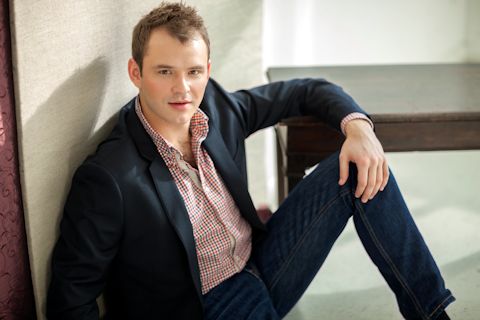Met Young Artist shows world-class artistry in Miami recital

Alexey Lavrov performed a wide-ranging recital of opera and song Wednesday night for Friends of Chamber Music in Miami.
Russian baritone Alexey Lavrov offered a generous sampling of Russian and Italian opera arias and songs by German, French, Russian and Italian composers in a terrific recital on Wednesday night, the closing season event for Miami’s Friends of Chamber Music.
A first-year member of the Metropolitan Opera’s Lindemann Young Artist Development Program, Lavrov, 27, demonstrated that it is only a matter of time before he commands principal baritone roles on the world’s leading opera stages. Displaying a rich, sizable voice and relaxed, suave demeanor, he strode the Gusman Concert Hall stage, enacting the characters from the operatic snippets on the program’s first half. With the charisma and good looks of a movie star, Lavrov turned each of the operatic excepts into a mini-drama.
The depth and solidity of Lavrov’s voice were immediately apparent in Che sprezzando (He who despises) by Handel, much more than the nominal warmup aria in Lavrov’s dramatic traversal. Two arias from Mozart’s Don Giovanni presented polar opposites of Lavrov’s theatrical temperament. As the Don impersonating his servant Leporello, he telegraphed sly, comedic wit in “Meta di voi.” The Don’s serenade, “Deh vieni alla finestra,” was light and elegant, the second stanza sung in beguiling soft tones. Lavrov’s beautiful legato was on display in “Questo amor” from Puccini’s early opera Edgar.
The Russian repertoire is a natural for Lavrov. His vociferous declamation and noble phrasing in Robert’s aria from Tchaikovsky’s final opera Iolanta contrasted with the soaring line and tonal heft he brought to Onegin’s rejection of Tatiana’s love from Eugene Onegin, strongly encompassing the character’s coldness and arrogance. Concluding with an exquisite pianissimo, Lavrov displayed superb vocal control and artful interpretive powers.
Rodrigo’s final aria from Verdi’s Don Carlo left no doubt that Italian opera will be Lavrov’s forte. Leaning over the piano, he potently represented Rodrigo being mortally wounded, the glorious flood of tone and subtle shading a joy to hear. The opera world needs first class Verdi baritones and Lavrov gave notice that, in a few years, he should fill that role impressively.
His adroit comic timing and breezy delivery enlivened Malatesta’s scheming “Bella siccome un angelo” from Donizetti’s Don Pasquale. The villager Silvio in Leoncavallo’s Pagliacci is often an early assignment for young baritones. Lavrov gave every indication that he will excel in this calling card role, bringing passion, plangent sonority and supple dynamics to Silvio’s plea to Nedda to run away with him.
The brilliant pianist Ken Noda brought seasoned artistry and sensitivity in his accompaniments to Lavrov’s youthful talents, with espeically grand sonority and exquisite shading in the Italian arias. In the two Tchaikovsky arias, Ekaterina Deleu, Lavrov’s wife, took over the keyboard. Her splendid technique was vividly displayed in the cascading runs of the Iolanta excerpt. (Next season Deleu commences a collaborative pianist-coach position with the Met’s Lindemann program.)
In the program’s second half, Lavrov was no less persuasive an interpreter of the song repertoire. Finely shaded Brahms and dramatic, trancelike Schumann indicated patrician lieder instincts. A wild, full-voiced rendition of Tchaikovsky’s Don Juan’s Serenade presaged the intensity of expression and depth of sonority Lavrov assayed in Rachmaninoff’s moving In the Silence of the Night and Rimsky-Korsakov’s Floating Chain of Clouds
Deftly enacting the worn nobility of “Chan a boire” from Ravel’s Don Quichotte a Dulcinee song cycle, Lavrov seemed a born cabaret entertainer and he became a vintage pop troubadour with a velvety version of Parlami d’amore. Over Deleu’s sweeping, rhapsodic piano figurations, Lavrov concluded with Georgy Sviridov’s O Homeland, bringing fervor and heart to this soaring anthem. A small but wildly enthusiastic audience repeatedly applauded and cheered this gifted star in the making.